最新冀教版七年级英语下册语法精讲全套
冀教版七年级下册英语Unit 4 After- School Activities 语法专题

典例 LucyandLily____C_goingtovisittheGreatWallth isweekend. A. isB. amC. areD. be
典例 We____B__haveapicnictogetherwithourteachers nextThursday. [白银] A. aregoingB. aregoingto C. willgoingD. maygoingto
考点3 含有begoingto的一般将来时的句型结构
eg:Iamgoingtowatchamovietomorrow. 明天我将要看电影。 Jimisn’tgoingtocomeback. 吉姆没打算回来。 Areyougoingtofinishtheworktomorrow? 你打算明天完成这项工作吗? Wherearetheygoingtotravel? 他们将去哪儿旅游?
二、单项选择 6.—ToseetheGreatWallismydream. I________Ditnextyear. —Soundsgreat. MayIgowithyou? A.visitB.visiting C.visitedD.amgoingtovisit
【点拨】由nextyear可知此句用一般将来时。
一、用所给词的适当形式填空
1.I__a_m_g_o_i_n_g_t_o_b_e___(be)amoviestarinthefuture. 2.__A_r_e____they__g_o_i_n_g_t_o_c_li_m_b____(climb)MountTaiwiththeir friendsnextmonth? 3.LucyandLily__a_r_e_g_o_in_g_t_o_w_a_t_c_h_ (watch)amovietomorrow evening. 4.—What____i_s___Tim___g_o_in__g_to_d_r_a_w____ (draw) onthe blackboard? —Idon'tknow. Let'swaitandsee. 5.Bequietplease,class. I__a_m_g_o_i_n_g_t_o_g_iv_e_o_u_t__(giveout) yourtestpapers.
冀教版七年级英语下册单元语法聚焦Summer Holiday Is Coming! 课件
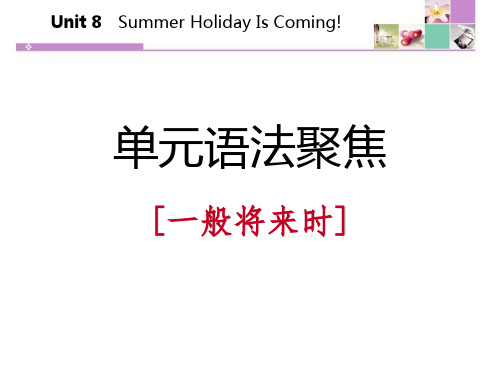
Unit 1 A Trip to the Silk Road
单元主题写作
单元主题写作
话题分析
本单元围绕“旅游”展开。根据这一话题而命题 的作文通常有制订旅行计划、介绍名胜古迹等。制 订旅行计划多用一般将来时,介绍名胜古迹时可以 介绍一些相关的文化风俗或者表达旅行的感受。
单元语法聚焦
2. 否定形式 (1)主语+be(am/is/are)+not+going to+do(动词原形)+其他. 如: We aren't going to play basketball after class. 下课后我们不打算去打篮球。 (2)主语+will/shall+not+do(动词原形)+其他. (will not常缩 写为won't) 如: I will not(won't) go shopping next Sunday. 下周日我不会去购物。
单元主题写作
高分模板
The summer holiday is coming. Do you want to go on a trip to Xi'an? We will have a threeday trip to Xi'an.
①It's about 800 kilometres from Shijiazhuang to Xi'an. We will go there by train. ②We plan to leave Shijiazhuang at 6:00 p.m. on Monday and will arrive there at 8 on Tuesday morning. Then we will visit some places of interest there. ③Xi'an is famous as the Walled City, so we will walk along the wall first. In the afternoon
冀教版七(下)英语短语-句型-语法

冀教版七(下)英语要点短语、句型、语法Unit 11.Guess what!猜猜看2.learn about学习关于3.plan to do sth 计划做某事4.go with sb 和某人一起。
5. climb up爬上 /climb down 爬下6.-May I ask you a question?我能问你一个问题吗?--Yes,you may./Sure/Of course/--No,you can’t.7. send sb sth =send sth to sb给某人寄某物8.go on a trip to … / take a tour to …去某地旅行9.How far is it from ..to ..?从某地到灵另一地有多远?It’s about +数词+meters/ kilometers .10.The Silk Road is about 6500 meters long.11.Welcome to Xi’an欢迎来西安12.places of interest 名胜古迹13.到达:arrive in +大地点, arrive at +小地点get to +地点, reach+地点14.be famous for 因…而著名,be famous as作为...而著名15.on one’s way to+名词= on the way to +名词on one’s way home/there(副词)在某人去某地途中e.g. on my way to school=on the way to school16.look for 寻找, look after=take care of 照顾, look out小心, look out of 向外面看look forward to +Ving.期待做…look up查找, 查阅17.N.photos!禁止拍照!No parking!禁止停车!take a picture/photo,take pictures/ photos照相18.fall off 跌落, 下降, 减少, 离开19.all right好的, 可以的That’.right..对.That’s all right.不用谢/没关系。
七年级英语下册Unit3Schoollife词句精讲精练(新版)冀教版.docx
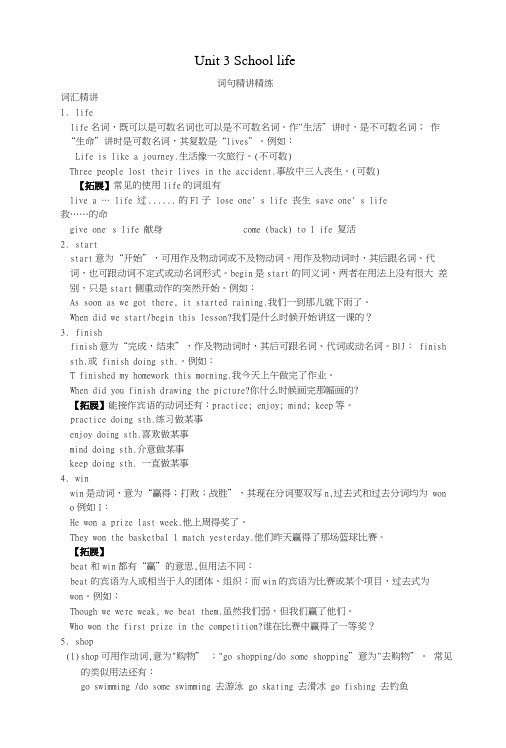
Unit 3 School life词句精讲精练词汇精讲1.lifelife名词,既可以是可数名词也可以是不可数名词。
作"生活”讲时,是不可数名词;作“生命”讲时是可数名词,其复数是“lives”。
例如:Life is like a journey.生活像一次旅行。
(不可数)Three people lost their lives in the accident.事故中三人丧生。
(可数)【拓展】常见的使用life的词组有live a … life 过...... 的Fl子lose one' s life 丧生save one' s life救……的命give one, s life 献身come (back) to 1 ife 复活2.startstart意为“开始”,可用作及物动词或不及物动词。
用作及物动词时,其后跟名词、代词,也可跟动词不定式或动名词形式。
begin是start的同义词,两者在用法上没有很大差别,只是start侧重动作的突然开始。
例如:As soon as we got there, it started raining.我们一到那儿就下雨了。
When did we start/begin this lesson?我们是什么时候开始讲这一课的?3.finishfinish意为“完成,结束”,作及物动词时,其后可跟名词、代词或动名词。
B|J: finish sth.或finish doing sth.。
例如:T finished my homework this morning.我今天上午做完了作业。
When did you finish drawing the picture?你什么时候画完那幅画的?【拓展】能接作宾语的动词还有:practice; enjoy; mind; keep等。
practice doing sth.练习做某事enjoy doing sth.喜欢做某事mind doing sth.介意做某事keep doing sth. 一直做某事4.winwin是动词,意为“赢得;打败;战胜”,其现在分词要双写n,过去式和过去分词均为won o例如I:He won a prize last week.他上周得奖了。
冀教版七年级英语下册各单元知识点归纳汇总
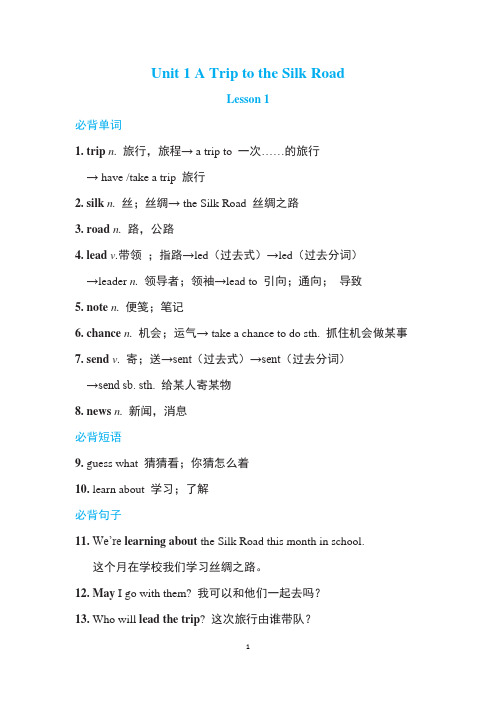
Unit 1 A Trip to the Silk RoadLesson 1必背单词1. trip n. 旅行,旅程→ a trip to 一次……的旅行→ have /take a trip 旅行2. silk n. 丝;丝绸→ the Silk Road 丝绸之路3. road n. 路,公路4. lead v.带领;指路→led(过去式)→led(过去分词)→leader n. 领导者;领袖→lead to 引向;通向;导致5. note n. 便笺;笔记6. chance n. 机会;运气→ take a chance to do sth. 抓住机会做某事7. send v. 寄;送→sent(过去式)→sent(过去分词)→send sb. sth. 给某人寄某物8. news n. 新闻,消息必背短语9. guess what 猜猜看;你猜怎么着10. learn about 学习;了解必背句子11. We’re learning about the Silk Road this month in school.这个月在学校我们学习丝绸之路。
12. May I go with them? 我可以和他们一起去吗?13. Who will lead the trip? 这次旅行由谁带队?Lesson 2必背单词1. exciting adj.使人激动的(用来修饰物)→ excited adj.感到兴奋的(用来修饰人)2. along prep.沿着……→ walk along 沿着……走3. kilometre n. 千米,公里4. special adj.特殊的;特别的→specially adv. 特殊地;特别地5. culture n. 文化6. arrive v. 到达,抵达→ arrive in 到达(大地点) → arrive at 到达(小地点)7. leave v. 动身;出发;离开→ left (过去式)→ left (过去分词)→ leave for sp. 前往某地;动身去某地必背短语8. plan for the trip 关于旅行的计划9. come back to 回到……必背句子10. How exciting! 多么令人激动!11. How far is it from Beijing to Xi’an?从北京到西安有多远?12. But we don’t have enough time to see it all.但是我们没有足够的时间去看它的全貌。
冀教版七年级英语下册 (单元语法聚焦)School Life 新课件
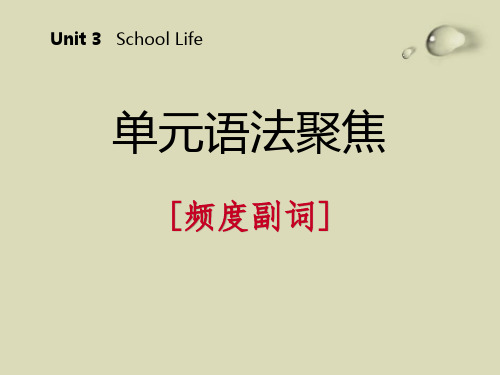
单元语法聚焦
[频度副词]
单元语法聚焦
教材典句
1. We always have a big sports meet twice a year. 我们每年总是举行两次大型的运动会。 2. We often make many different things in shop class. 在手工艺课上我们经常做许多不同的东西。 3. Sometimes we work in groups. 有时我们以小组的形式工作。
单元语法聚焦
(二)频度副词在句中的位置 通常放在行为动词之____前____(前/后),系动词、情态动词或助 动词之___后_____(前/后)。 He often goes to work by bike. 他经常骑自行车去上班。 He is never late for class. 他上课从不迟到。
What clear water! 多么清澈的水啊!
how
How+__形__容__词___/副__词_____(+主语+谓
语)!
How beautiful (the flowers are)! 多么漂亮(的花)啊!
单元语法聚焦
[注意] 感叹句记忆口诀 感叹句,并不难,what与how应在前。 形容词、副词跟着how, what后面名词连。 名词若是可数单,前面冠词a或an。 主语、谓语放后面,省略它们也常见。
【解析】 句意:看!看到这些可爱的大熊猫,这个男孩多 兴奋啊!根据空后的形容词excited可知,该感叹句用how开 头,故排除C、D;how修饰形容词excited,而不是名词boy, 所以不用冠词,故选A。
单元语法聚焦
( A )5.2017•郴州改编 —________ friendly boy he is!
冀教版七年级下册英语期末复习语法知识点提纲
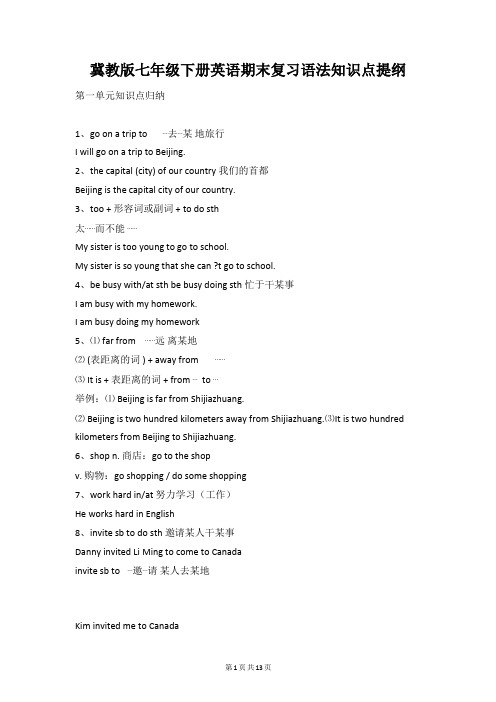
冀教版七年级下册英语期末复习语法知识点提纲第一单元知识点归纳1、go on a trip to ⋯去⋯某地旅行I will go on a trip to Beijing.2、the capital (city) of our country 我们的首都Beijing is the capital city of our country.3、too + 形容词或副词 + to do sth太⋯⋯而不能⋯⋯My sister is too young to go to school.My sister is so young that she can ?t go to school.4、be busy with/at sth be busy doing sth 忙于干某事I am busy with my homework.I am busy doing my homework5、⑴ far from ⋯⋯远离某地⑵ (表距离的词 ) + away from ⋯⋯⑶ It is + 表距离的词 + from ⋯ to ⋯举例:⑴ Beijing is far from Shijiazhuang.⑵ Beijing is two hundred kilometers away from Shijiazhuang.⑶It is two hundred kilometers from Beijing to Shijiazhuang.6、shop n. 商店:go to the shopv. 购物:go shopping / do some shopping7、work hard in/at 努力学习(工作)He works hard in English8、invite sb to do sth 邀请某人干某事Danny invited Li Ming to come to Canadainvite sb to ⋯邀⋯请某人去某地Kim invited me to Canada9、want to do sth 想要干某事 He want to buy a book.want sb to do sth 想要某人干某事(同 would like )My mother wants me to work hard every day.10、talk to/with sb 和某人交谈、和某人谈话talk about sth 谈论某事11、call 喊、打电话 call sb (on the telephone) 给某人打电话12、leave for ⋯⋯动身去某地Danny will leave for Beijing13、stay with sb 和某人住在一起14、交通方式:by bus/bike/car/train/plane/sea /motor bike/boat/taxi② on a bus/bike/train/plane/boat③ take a bus/bike/car/train/plane/boat/taxi④其它:in a car/ boat/taxi ; on foot ; ride a bike15、May I ⋯⋯ ?M ay I go shopping?肯定回答:Yes, please /Yes, of course /Sure否定回答:No, you may not /No, you can? t16、plan n. 计划 make a plan for sth 为某事制定计划I am making a plan for the summer holidayv. 计划 plan (for) sth 为某事做计划plan to do sth 计划干某事I plan to go on a picnic17,need to do sth 需要去作某事 He needs to go out for a walk18、tell sb about/of sth 告诉某人关于某事He told me about this news19、go back to ⋯⋯回到某地Li Ming will go back home on July 11 thLi Ming will go back to Shijiazhuang20、pack A with B 把 B 打包放进 A 中例如:Xiaomei is packing her bag with her books .21、write to sb / write sb a letter / write a letter to sb 给某人写信I will write a letter to my mother. I will write to my mother. I will write my mother a letter22、a suit of clothes 一套衣服a pair of shoes 一双鞋子two pairs of glasses 两副眼镜注意:pair 短语在句中如果作主语,应根据pair 的单复数决定谓语动词的单复数24、Have a good trip ----Thank you 旅途愉快第二单元知识点归纳1、argue with sb about sth 因某事和某人争论2、get on 上车get off 下车3、be ready for sth 为某事做准备I am ready for the exam.4、a ticket to Canada 去加拿大的票5、in +某种语言——用某种语言What?s this in English?speak+某种语言——说某种语言He speaks English.6、pardon me 对不起、请重复一遍 =Excuse me7、have to(客观的必须)=must(主观上的必须)必须、不得不、一定得I have to work hard.8、look out of 从⋯⋯向外看 look out of the window9、here and there 到处、四处10、point to 指向 point at 指着point out 指出11、at the top of 在⋯⋯的顶端at the bottom of 在⋯⋯的底部12、try to do sth 努力、设法干某事13、be from spl = come from spl 来自某地16、places of interest /the interesting place 名胜古迹17、enjoy doing sth 喜欢干某事Danny enjoy eating donuts .18、hope to do sth 希望干某事I hope to go out hope+宾语从句希望⋯⋯My father hopes that he will have a nice trip.19、It?s time for sth. It?s time for schoolIt?s time to do sth It?s time to go to schoolIt?s time for sb to do sth It ?s time for me to go to bed该干某事的时候了20、wait for sb/sth 等待某人、某物21、find out 查出、查明f ind sb doing sth 发现某人正在干某事22、feel+形容词 / be +形容词:感觉怎么样How do you feel? I feel happy.23、a bowl of /a bottle of /a glass of /a cup of / a can of 一碗 / 一瓶 / 一杯/ 一听24、be quiet 安静keep quiet 保持安静25、play with sb 和某人一起玩play with sth 玩弄某物如:Don?t play with fire ! 不要玩火!play +球类名词(不要 the)play+the +乐器名词(必须要 the)26、watch TV / a football match / a moviesee a flimread the book / the newspaper27、show sb sth=show sth to sb 给某人看某物28、take care of = look after 照看、照料、照顾29、look for 寻找(强调过程)find 找到(强调结果)第三单元知识点归纳1、let sb do sth 让某人干某事 Let me help you.2、I speak good English = I speak English well 我英语讲得好 .3、translate for sb 为某人翻译4、laugh at sb 嘲笑某人Don?t laugh at others.fly a kite / fly kites 放风筝5、have fun 玩得高兴have fun (in) doing sth 干某事玩得很开心I have fun playing soccer.6、make fun 开玩笑7、hurt one?s +身体部位:hurt my nose / hurt my arm .8、Don?t be afraid . 不要害怕Don?t worry . 不要担心9、be careful / look out/take care 小心、当心10、worry about sth /sb Don?t worry about me.sb be worried about sth /sbMy mother is worried about my study.担心某物 / 某人11、put ⋯ on ⋯把⋯⋯放在⋯⋯上put ⋯ in 把⋯⋯⋯放进⋯⋯里12、take one?s picture 给某人照相take a picture /take pictures/photos 照相13、用⋯⋯ with + 具体工具如:She write a letter to her friends with pen .by 通过某种方式如:She sends messages to her friends by postcard14、fall off 从⋯⋯上掉下来 He fell off his surfboard15、help sb do sth help sb with sth 帮助某人干某事Jenny helps me learn English. Jenny helps me with English16、at the post office 在邮局17、break his tail 折断了他的尾巴Danny broke his tail yesterday18、at the traffic lights 在交通灯的地方19、There be + sb +动词 ing 形式+地点(介词短语)某处有某人正在干某事There is a girl dancing in the room.20、on the left 在左边on the right 在右边21、on the postcard 在明信片上23、go straight down ⋯沿⋯着⋯⋯直走24、in an hour 一个小时以后 I will come back in an hour25、write sb a letter / write a letter to sb / write to sb给某人写信26、a pair of chopsticks 一双筷子27、send sb sth /send sth to sb给某人寄(送)某物He sent me a postcard. He sent a postcard to me28、buy sb sth / buy sth for sb 给某人买某物I buy my mother a gift.= I buy a gift for my mother.29、be late for sth 干某事迟到 He is late for work.30、turn left 向左转 turn right 向右转31、begin/start to do sth begin/start doing sth开始干某事32、a gift for sb 给某人的礼物33、a kind of 一种all kinds of 各种各样的34、A man who has not climbed the Great Wall is a true man . 不到长城非好汉35、see sb doing sth 看见某人正在干某事(动作正在进行)I saw many people flying kites on the squaresee sb do sth看见某人干了某事(动作发生的过程)36、许多many +可数名词m any books much+不可数名词 muchmeata lot of/ lots of + 可数或不可数名词37、一些 a little +不可数名词 a few +可数名词some/any + 可数或不可数名词(注意:some 用于肯定句any用于否定句和疑问句)38、put on 穿上、戴上(穿的动作)wear 穿着、戴着(穿的状态)39、turn on 打开turn up 调大turn off 关闭turn down 调小40、停止干某事stop to do sth 停下来去做另外一件事I stop to have a reststop doing sth 停止正在干的事I stop talking41、在⋯⋯的前面in front of 在(室外)没有局限空间的地方的前面There is a tree in front of the classroomin the front of 在(室内)有限空间的地方的前面There is a TV in the front of the classroom.第四单元知识点归纳1、Thank sb for sth 为某事谢谢某人Thank you for your invitationThank sb for doing sth 谢谢某人干某事Thank you for inviting me to your party2、at the airport 在飞机场3、It is for you 它是给你的4、the first /second day 第一 /二天5、This is sb at /in spl 这是某人在某地6、This sth is for sb 这是给某人的某物This book is for you7、receive/get⋯⋯ from ⋯⋯收到来自⋯⋯的⋯⋯8、ask for 请求9、ask sb for sth 向某人要(请求)某物 .Ask sb to do sth 要求某人干某事。
冀教版七年级下英语各单元语法专项课件
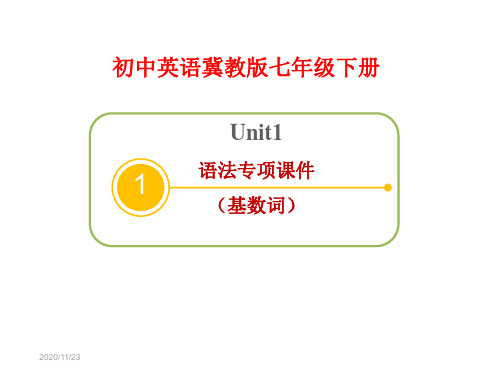
语法透视
考点大观 易错辨析 通关训练
There will be a sports meeting this weekend. (改为同义句) There _i_s__ _g_o_i_n_g_ __to___ be a sports meeting
this week.
Next
2020/11/23
语法透视
语法透视
shall/will+动词原形
考点大观 易错辨析 通关训练
肯定句形式: 主语 + shall/will + do sth.
People will have robots in the future.
否定句形式:主语 + shall/will + not + do sth. (will not 缩写为 won’t)
解析
【解析】数词thousand前有具体数字修饰,表示 确定数目,thousand用单数形式,故排除B/D; 表示几十几时,十位数和个位数之间需加连字符 “-”,所以答案选A。
2020/11/23
初中英语冀教版七年级下册 Unit1
语法专项课件 (一般将来时)
2020/11/23
Part
2020/11/23
2020/11/23
语法透视
基数词定义及拼写 考点大观 2)13--19, 由3-9 + teen构成。
14–fourteen 16--sixteen 17--seventeen 19—nineteen
易错辨析 特殊拼写: 13– thirteen 15--fifteen 18—eighteen 通关训练
语法透视解析考点大观易错辨析通关训练20201123unit1语法专项课件一般将来时初中英语冀教版七年级下册20201123part语法透析考点大观易错辨析通关训练20201123语法透视考点大观易错辨析通关训练一般将来时定义表示将来会出现或发生的动作和状态
七年级英语下册 Units1 A trip to Beijing 重点讲解 冀教版
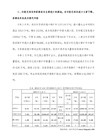
七年级英语Unit 1 A Trip to Beijing Lesson 5–Lesson 8冀教版【本讲教育信息】一. 教学内容:Unit 1 A Trip to Beijing Lesson 5–Lesson 81. 单词和短语Wednesday at chant Friday good-bye home make Monday museum plan Saturday stay Sunday then Thursday Tuesday week with favorite all bear teddy bear clothes forget jacket knee more near need now pack suitcase sure those buy up down excited fun jump love me ready run sorry stand stand up station stop there walk likes2. 语法(1)情态动词的用法。
(2)介词用法。
(3)祈使句。
3. 交际用语(1)How much for a ticket from…to…?(2)There is the train!(3)Let’s…!——Please don’t run/jump/sit down!(4)Have a good trip!二. 重点、难点分析1. Could you help me,please?你能帮我个忙吗?I help my mother(to)clean the house every day.我每天帮助妈妈打扫房子。
My friend often helps me with my English. 我朋友经常帮助我学英语。
名词,“帮助;协助;援助”。
如:Thank you for your help. 谢谢你的帮助。
They need some help. 他们需要一些援助。
七年级下册英语冀教版知识点

七年级下册英语冀教版知识点七年级下册英语冀教版的学习内容丰富多样,涵盖了语法、词汇、句型、听力、阅读和写作等多个方面。
以下是对这些知识点的详细梳理。
一、语法1、一般过去时一般过去时表示过去发生的动作或存在的状态。
其构成是主语+动词的过去式+其他。
动词过去式的变化规则:一般在动词末尾加 ed,如:play played 。
结尾是 e 的动词加 d,如:like liked 。
重读闭音节词,双写末尾辅音字母再加 ed,如:stop stopped 。
不规则动词的过去式需要特殊记忆,如:go went , have had 。
2、现在进行时现在进行时表示正在进行的动作。
其构成是主语+be(am/is/are)+动词的现在分词+其他。
现在分词的构成规则:一般在动词末尾加 ing,如:read reading 。
以不发音的 e 结尾的动词,去 e 加 ing,如:write writing 。
重读闭音节词,双写末尾辅音字母再加 ing,如:run running 。
3、形容词和副词的比较级和最高级比较级用于两者之间的比较,最高级用于三者或三者以上的比较。
比较级的构成规则:一般在词尾加 er,如:tall taller 。
以重读闭音节结尾且末尾只有一个辅音字母的形容词,双写这个辅音字母再加 er,如:big bigger 。
以“辅音字母+y”结尾的形容词,把 y 变为 i 再加 er,如:heavy heavier 。
最高级的构成规则:一般在词尾加 est,如:tall tallest 。
以重读闭音节结尾且末尾只有一个辅音字母的形容词,双写这个辅音字母再加 est,如:big biggest 。
以“辅音字母+y”结尾的形容词,把 y 变为 i 再加 est,如:heavy heaviest 。
不规则的比较级和最高级需要特殊记忆,如:good/well better best , bad/ill worse worst 。
七年级下英语知识点冀教
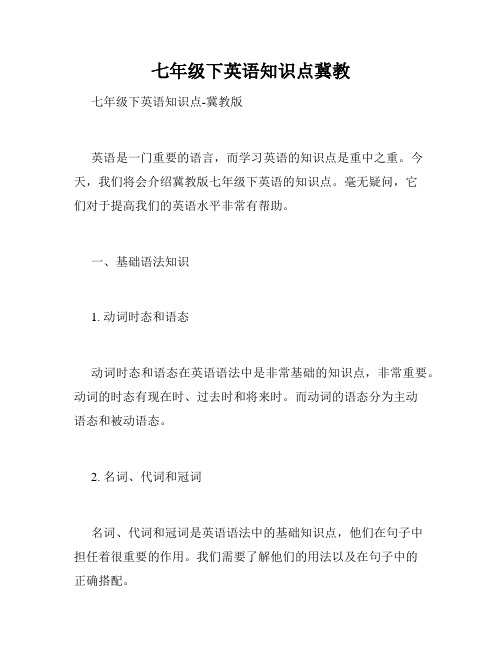
七年级下英语知识点冀教七年级下英语知识点-冀教版英语是一门重要的语言,而学习英语的知识点是重中之重。
今天,我们将会介绍冀教版七年级下英语的知识点。
毫无疑问,它们对于提高我们的英语水平非常有帮助。
一、基础语法知识1. 动词时态和语态动词时态和语态在英语语法中是非常基础的知识点,非常重要。
动词的时态有现在时、过去时和将来时。
而动词的语态分为主动语态和被动语态。
2. 名词、代词和冠词名词、代词和冠词是英语语法中的基础知识点,他们在句子中担任着很重要的作用。
我们需要了解他们的用法以及在句子中的正确搭配。
3. 形容词和副词形容词和副词在描述事物和情况时扮演着很重要的角色。
在英语语法中,了解形容词和副词的用法和区别非常重要,同时需要掌握他们的比较级和最高级。
二、阅读理解和写作1. 阅读理解阅读理解是学习英语时不容忽视的重要技能。
冀教版七年级下英语中有许多文章需要学生们进行阅读,并能够回答文章中的问题。
在阅读理解中,读者需要掌握一些阅读技巧以及对文章中的主要信息和细节有清晰的理解。
2. 写作写作是英语语言学习的重要环节,它对于提高英语重要能力有着很大的帮助。
冀教版七年级下英语中,学生们需要进行书面表达,例如写日记、写信、写作文等。
在写作中,学生需要掌握正确的写作思路,用到恰当的词汇和语法,从而能够构成一个合理、合理的句子或段落。
三、单词学习1. 词汇量词汇量对于学习英语来说是非常重要的。
当我们掌握了越多的单词,我们就能更好地理解英语的含义。
在冀教版七年级下英语中,学生需要掌握大约1500个英语单词。
2. 词汇分类在学习英语单词时,我们需要把他们进行合理的分类,例如人、动物、时间、空间等等。
这样学生们可以更加清晰地记忆词汇,同时掌握更多的单词拓展他们的应用能力。
总之,冀教版七年级下英语的知识点是非常重要的,通过逐条学习我们能够对英语语法有更全面、清晰的了解,从而能够更加自信地掌握英语技能。
无论是学习或考试,了解和掌握这些知识点都可以给我们带来收益。
冀教版七年级英语下册单元语法聚焦I Love Learning English 课件
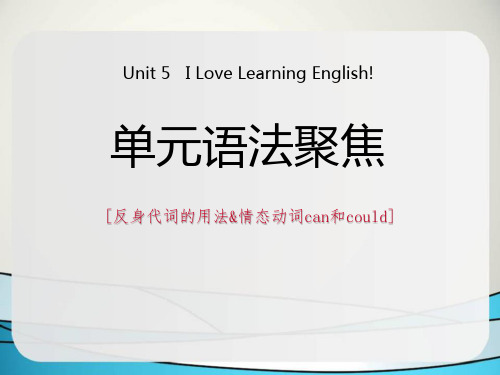
单元语法聚焦
语法探究
反身代词是一种表示反射或强调的代词,意为“自己;本身; 亲自”。反身代词与它所指代的名词或代词形成互指关系,在 人称、性质、数上应保持一致。
单元语法聚焦
(一)反身代词的单复数形式
人称/数 第一人称
单数 myself
复数 ourselves
第二人称
yourself
yourselves
第三人称 himself/herself/itself themselves
单元语法聚焦
(二)反身代词的用法 1.反身代词作宾语,放在动词或介词__之__后____。如: I could not dress myself at that time. 那时我不会自己穿衣服。 She learned English all by herself. 她完全是自学的英语。
单元语法聚焦
2.反身代词不能作主语,但是它可以作主语同位语,起强调 作用,放在主语后或句末。如: Did you make the cake yourself? 这个蛋糕是你亲自做的吗? [注意] 反身代词表示“某人自己”,不表示“某人的东西”。 如果要表达“某人自己的东西”,可以用“one's own+sth.”。
单元语法聚焦
( C )8.—Could I park here?
—Sorry. I am afraid you ________. Look at the sign “No
parking!”
A.couldn't
B.needn't
C.can't
D.won't
【解析】 could意为“可以”,表示许可,是一种委婉的表达,其否定 回答应用can't。
新冀教版初中英语精品课件七年级下册Unit 1 语法专题

典例 —I think I’ll take a bus to the meeting.
—The bus? If you do, you ____C____ late.
A.will
B.are
C.will be
【点拨】此句含if引导的条件状语从句,意为“如果你这 样做,你将会迟到。”根据语法判定法,在含有条件状语 从句的复合句中,主句用一般将来时,条件状语从句用一 般现在时表将来。
一、用所给词的适当形式填空
1.Tom with his parents_w_i_ll_v_i_s_it_(visit)the museum tomorrow. 2.What ____w__il_l___ your sister____d_o_____(do) next Sunday? 3.My brother has gone to Beijing. He_w__il_l_c_o_m_e__(come) back
15.it, two, thousand, kilometre, is, about _I_t _is__a_b_o_u_t_t_w_o__th_o_u_s_a_n_d__k_i_lo_m__e_tr_e_s____________.
—Sorry, I ____D____ skating with Tom.
A.go
B.went
C.have gone
D.will go
【点拨】用正确把握语境法。问句句意为“明天你要和我 一起去看电影吗?”答句句意为“对不起,我将和汤姆一 起去滑冰。”故选D。
三、连词成句(注意各小题的词形变化) 11.the, Green, will, to, a, new, city, tomorrow, move
冀教版丨七年级下册英语语法讲解及试题(附答案)
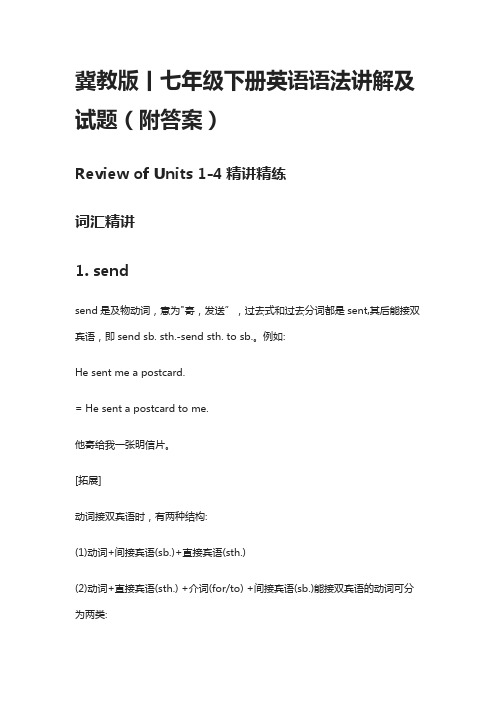
冀教版丨七年级下册英语语法讲解及试题(附答案)Review of Units 1-4精讲精练词汇精讲1. sendsend是及物动词,意为"寄,发送”,过去式和过去分词都是sent,其后能接双宾语,即send sb. sth.-send sth. to sb.。
例如:He sent me a postcard.= He sent a postcard to me.他寄给我一张明信片。
[拓展]动词接双宾语时,有两种结构:(1)动词+间接宾语(sb.)+直接宾语(sth.)(2)动词+直接宾语(sth.) +介词(for/to) +间接宾语(sb.)能接双宾语的动词可分为两类:(1) 常用介词to的动词有: send; give; show; bring; show;teach; tell等。
例如: give sb. sth. = give sth. to sb.给某人某物show sb. sth. = show sth. to sb.出示某人某物(2)常用介词for的动词有: buy; sing; make; cook; get等。
例如:buy sb. sth. = buy sth. for sb.为某人买某物make sb. sth. = make sth. for sb.为某人制作某物2. amazing(1) amazing意为“令人吃惊的”,指某物或某事让人惊讶。
例如:What an amazing picture!多么出奇的一幅画!(2) amazing与amazed的区别:amazed作形容词,或者被动式be amazed at (by) 意为.对...为惊奇”。
例如: be amazed to see看到....感到吃惊;be amazed to hear听到...感到吃惊amazed和amazing的主要区别是:人常表示amazed,因为人是吃惊这一行为的主体,而东西,或者人的行为等等往往是amazing,表示“令人吃惊的”。
七年级英语下册(冀教)单元语法讲解及习题
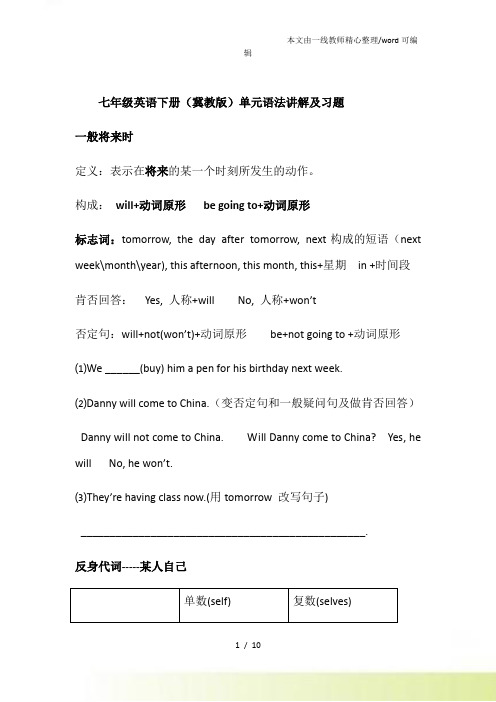
七年级英语下册(冀教版)单元语法讲解及习题一般将来时定义:表示在将来的某一个时刻所发生的动作。
构成:will+动词原形be going to+动词原形标志词:tomorrow, the day after tomorrow, next构成的短语(next week\month\year), this afternoon, this month, this+星期in +时间段肯否回答:Yes, 人称+will No, 人称+won’t否定句:will+not(won’t)+动词原形be+not going to +动词原形⑴We ______(buy) him a pen for his birthday next week.⑵Danny will come to China.(变否定句和一般疑问句及做肯否回答)Danny will not come to China. Will Danny come to China? Yes, he will No, he won’t.⑶They’re having class now.(用tomorrow 改写句子)_________________________________________________.反身代词-----某人自己单数(self) 复数(selves)第一人称myself ourselves第二人称yourself yourselvesthemselves第三人称himself herselfitselfby+oneself(单独,独自)enjoy+oneself(玩的高兴)help+oneself to (请随便....)Look after+oneself(照顾某人自己)learn by oneself=teach oneself(自学)1.You should believe in______. That’s the secret of success.A.HimselfB. itselfC. herselfD. yourself2.The boy is six years,but he can do some housework by_________(he).3.She is proud of ______(she) for not giving up easily.4.Be careful with the knife. You may hurt_______.A.himselfB. ourselvesC. myselfD. yourself5.I guess Tom and Celia enjoyed_______at the party last night.A.myselfB. himselfC. herselfD. themselves6.Children, help ______(oneself) to some fruit.7.Lucy, help ______(oneself) to some fruit.8.----Who teaches_____ maths?---- I teach________.A.Your, myselfB. you, myselfC. you, meD. you, yourself感叹句(what, how)what----中心词为名词how-----中心词为形容词,副词What+a/an+形容词+名词+主语+谓语!(可数名词的单数)what + 形容词+名词+主语+谓语!(不可数名词/可数名词的复数)How+形容词/副词+主语+谓语!做题方法:空后有无名词(出掉主语,谓语之后)有名词用what ,但还需判断名词为可数名词,还是不可数名词,可数名词的单数记得加a/an;没有名词用how。
- 1、下载文档前请自行甄别文档内容的完整性,平台不提供额外的编辑、内容补充、找答案等附加服务。
- 2、"仅部分预览"的文档,不可在线预览部分如存在完整性等问题,可反馈申请退款(可完整预览的文档不适用该条件!)。
- 3、如文档侵犯您的权益,请联系客服反馈,我们会尽快为您处理(人工客服工作时间:9:00-18:30)。
最新冀教版七年级英语下册语法精讲全套Unit 1 A Trip to the Silk Road语法精讲一、数词(一) 定义与分类数词是指表示数目多少或顺序先后的词。
表示数目多少的数词叫基数词,如one, five, ten, thirty, sixty-five 等;表示顺序先后的数词叫序数词,如first, sixth, tenth, twenty-first 等。
数词用法相当于名词和形容词,在句中可用作主语、宾语、表语、定语、同位语等。
(二)基数词1.英语中没有“万”这个读数单位,要表示汉语中的“万”,英语需借用thousand一词,如“一万”用“十个千”表示(ten thousand),“十万”用“一百个千”表示(one hundred thousand)。
2.用作基数词单位的hundred, thousand, million, billion 通常不带复数词尾-s,但若用于表示数百、数千、数百万这样的泛指,则用复数。
About two thousand people died in the earthquake.大约有两千人在地震中丧生。
Thousands of people go to the seaside every year.每年成千上万的人到海滨去。
3.表示整十的基数词用复数形式可以表示人的大约岁数或年代。
He is in his early twenties.他才二十出头。
This took place in the 1930s.这事发生在20世纪30年代。
(三)序数词1.许多序数词是由相应的基数词后加词尾-th构成的,如four/fourth,six/sixth,ten/tenth,sixteen/sixteenth,但是nine变为序数词是ninth,而不是nineth。
2.twentieth, thirtieth, fortieth等表示整十的序数词,由相应的基数词将词尾y改为ie,再加-th构成。
3.first, second, third通常可缩写为1st, 2nd, 3rd。
凡是以th结尾的序数词可缩写为“基数词+th”:4th, 5th, 9th, 11th, 60th, 128th等。
4.非整十的多位数,将个位数变成序数词即可:twenty-first(第21),thirty-sixth(第36),ninety-ninth(第99),three hundred and sixty-fifth(第365)等。
5.hundred, thousand, million等序数词形式为hundredth, thousandth, millionth 等。
6.序数词前通常要用定冠词,但表示考试或比赛等的名次时,通常可省略其前的定冠词。
He was (the) third in the exam.他考试得了第三名。
【注意】(1)有时序数词前不用定冠词,而用不定冠词,表示次第在原有基础上的增加。
We’ll have to do it a second time.我们得再做一次。
(2)序数词前用定冠词和不定冠词的区别在于:定冠词表特指,不定冠词表泛指,有类似another的意思,但比another 的意思更明确。
二、一般将来时(一)(一)概念一般将来时表示将来某一时刻的动作或状态,或将来要发生的事情。
(二)构成主语+will+动词原形(三)用法一般将来时常与一些表示将来的时间状语连用,如:tomorrow(明天), next week(下周), from now on(从现在开始);in the future(将来);someday (未来的某一天) 等。
(四)一般将来时的句子结构1.肯定句:My father will go to Shanghai next week.我父亲下周要去上海。
We shall go to school tomorrow.明天我们将要去上学。
2.否定句:My father won’t go to Shanghai next week. 我父亲下周将不会去上海。
We shall not go to school tomorrow.我们明天将不去上学。
3.一般疑问句:Will your father go to Shanghai next week? 你爸爸下周将要去上海吗?肯定回答:Yes, he will.是的,他将要去。
否定回答:No, he won’t.不,他将不去。
Shall we go to school tomorrow?我们明天将要去上学吗?肯定回答:Yes, we shall.是的,我们将会。
否定回答:No, we shall not.不,我们将不会。
4.特殊疑问句:—When will your father go to Shanghai?你爸爸什么时候将要去上海?—Next week.下周。
—When shall we go to school?我们什么时候去上学?—Tomorrow.明天。
【注意】will 用于各种人称, shall 只用于第一人称I,we。
Unit 2It’s Show Time!语法精讲一般过去时(一) 定义一般过去时表示过去经常进行的动作或所处的状态,多与时间状语yesterday, last…,…ago, just now, the other day, once upon a time, when she was young等连用。
(二)句式结构肯定句式: 主语+过去式.否定句式: 主语+助动词didn’t+动词原形.疑问句式: 助动词Did+主语+动词原形?(三)一般过去时的用法1.表示过去某一时刻或某段时间发生的事,多与时间点或时间段连用。
I studied in this school ten years ago.十年前我在这所学校学习。
I got up at six this morning.今天早晨我六点起床的。
2.表示过去连续发生的动作,往往没有时间状语,而是通过上下文来表明过去的含义。
She opened the window, looked out and found some birds in the sky.她打开窗户、向外看了看, 看到空中有一些鸟。
3.某些句子,虽然没有表示过去确定时间的状语,但实际上是指过去发生的动作或存在的状态,也应该使用过去时。
I didn’t know you were here.我不知道你在这里。
We thought you were ill.我们以为你病了。
(四)动词过去式的变化动词的过去式有规则变化和不规则变化两种形式,一般是在词尾加-ed构成。
不规则变化的过去式没有特定的规律,需要特别记忆。
1.规则变化的过去式(1)一般情况下,在动词的词尾加ed构成。
walk—walked, offer—offered, join—joined(2)以不发音字母e结尾的,直接加d构成。
live—lived, hate—hated, escape— escaped(3)以重读闭音节结尾,并且词尾只有一个辅音字母的,要先双写这一字母再加ed。
stop —stopped,prefer—preferred(4)以“元音字母+ y”结尾的直接加ed,以“辅音字母+ y”结尾的应先将y改为i再加ed构成。
play—played, copy—copied,try—tried,carry—carried2.不规则变化的过去式(1)原形和过去式相同。
花费cost cost切割cut cut(2)字母o改为a。
成为become became来come came(3)过去式为ought结尾的。
带来bring brought买buy bought战斗fight fought想think thought(4)过去式为aught结尾的。
抓住catch caught教teach taught(5)将eep改为ept。
保持keep kept打扫sweep swept(6)字母i改为a。
下沉sink sank游泳swim swam(7)字母ow改为ew。
知道know knew投掷throw threwUnit 3School Life语法精讲频度副词(一) 定义在某一时间段内表示动作发生频率的副词就是频度副词。
usually, sometimes, always, often等词被称为频度副词,是用来表示动作频率的,但程度上有别。
常见频度副词按频率大小排列如下:always>usually>often>sometimes>seldom> never(二)频度副词的位置频度副词在句中习惯上位于be动词、助动词之后,行为动词之前。
1.在be动词之后。
She is sometimes very busy.她有时很忙。
2.在第一个助动词或情态动词之后。
I will never forget this lesson.我将永远忘不了这一课。
3.在实义动词之前。
We often go there.我们经常去那儿。
4.sometimes可放在句首、句中或句末,often也可放在句末(一般不放在句首)。
Sometimes she writes to me.=She writes to me sometimes.她有时候给我写信。
She writes to me often.她经常给我写信。
(三)常见频度副词的用法1.always频率最高,表示动作重复、状态继续,表示“一直,总是”,其反义词为never。
always 与not连用时,表示部分否定。
The rich are not always happy.有钱人并不总是快乐的。
【注意】如果要变为否定句,应将always改为never才能全部否定。
Li Ping is always late for school.李平上学总是迟到。
Li Ping is never late for school.李平上学从不迟到。
(全部否定)Li Ping is not always late for school.李平上学不总是迟到。
(部分否定)ually意为“通常”,表示习惯性动作或状态,很少有例外。
We usually go to school at seven in the morning.我们通常在早上七点上学。
3.often意为“经常,时常”,表示反复性的动作或状态,中间有间断,不如usually那么频繁。
其反义词是seldom。
often在句尾时常被very或quite修饰。
It often rains here in April.这儿四月份经常下雨。
The boys often eat noodles and the girls sometimes eat them.男生经常吃面条,女生有时吃。
